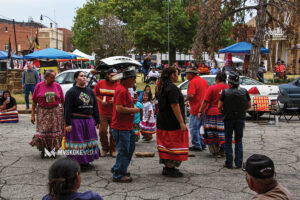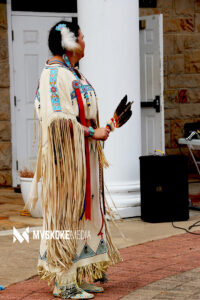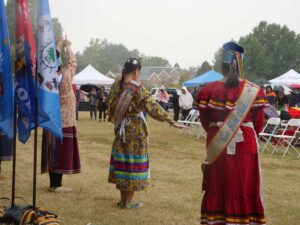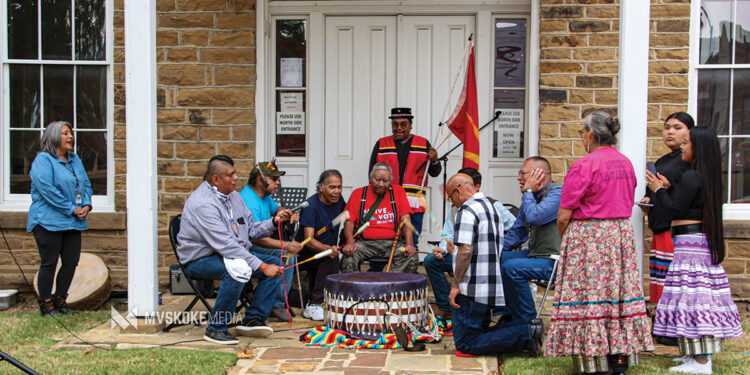Byline: Morgan Taylor/Multimedia Producer, Kaylea Berry/Reporter, Braden Harper/Reporter
MUSCOGEE (CREEK) NATION, Oklahoma – Over 574 federally recognized tribes across the country celebrated the modern day Indigenous Peoples’ Day in various states including multiple locations throughout the Mvskoke Reservation including Okmulgee, Tulsa and Muskogee on Oct. 10.
President Joe Biden made the first federal proclamation of the holiday just last year and did so again this year although it is still technically the federal holiday, Columbus Day. Two congressional bills aim to change that.
Since Biden’s initial proclamation, over 130 states and cities have adopted the recognition and observance of Indigenous Celebrations for the day.
The controversy regarding the holidays’ meaning goes back some years with South Dakota to be the first state to recognize the holiday in 1990.
Celebrations on the Mvskoke Reservation are a recent tradition started within the last five years.

Creek Council House
Many people came to the Fifth Annual Indigenous Peoples’ Day celebration on the historical Creek Council House grounds Oct. 11 in Okmulgee. Speakers, singers, and vendors provided entertainment for attendees. The Muscogee Lady Legends cooked and served a free lunch for everyone. Brenda Golden, Indigenous Peoples’ Day co-organizer, spoke to everyone about the importance of this celebration.
“Our biggest goal is just to come out and celebrate being Creek and Mvskoke and just being Indigenous,” said Golden. “There are several cities here in Oklahoma that are celebrating today, … we’re just joining in with the rest of the Natives across the state.”
Creek hymn singing, ‘Indian Elvis’, Seminole Nation Historic Preservation, Sons of Mvskoke, and more entertained the crowd during the celebration. Through songs and stories, traditions were told and remembered.
Vendors sold traditional clothing, t-shirts, blankets, pillows, jewelry, and many more handmade items. Some of the vendors that participated were 4 Locv, Red Dirt Rags, Lucinda Hickory Research Institute, Mvskoke Nation Youth Services, and MCN Election Board.
“I believe that we fed about 500 people today,” Mvskoke Lady Legends chairperson Rita Williams said. “The council legislation that passed to give us $2,000 to help this year, I don’t think without their help we would’ve been able to do this.”
Terra Beaver, Indigenous Peoples’ Day co-organizer, talked about the importance of everyone coming together and recognizing Indigenous Peoples’ Day.
“Our time is now to be right here celebrating and embracing our culture and diversity always and it’s always a good time to be out here with everyone interacting and fellowshipping.”
There is so much that goes into putting an event like this on. There was collaboration between many different organizations including the Indigenous Peoples’ Day committee, departments within Muscogee (Creek) Nation, the City of Okmulgee, and various individuals. Everyone came together for a common cause, to celebrate and recognize Indigenous People, the history and culture.
There is a Facebook page ‘Indigenous Peoples’ Day committee’ that provides information on the event and can be used to contact Beaver or Golden. They can always use volunteers to help with the set up and take down of the event.
Bacone College
At the oldest operating higher education institution, formerly an orphanage for Indian Children after the Trail of Tears, The Muskogee Oklahoma Native American Association (MONAA) partnered with Bacone College administration to host their celebrations for Indigenous Peoples’ Day.
“We want the (Bacone) students to have an educational experience,” MONAA Media Relations Specialist Megan Kelly said.

Attendees gathered Monday morning in front of the Palmer Center to march in remembrance of the native children who were lost at boarding school.
According to Kelly, almost every Native American has been affected by boarding schools.
“Members of my family attended boarding school,” Kelly said. She mentions how they fled from boarding school back home to escape abuse. “Some of those never made it home.” Which she claims adds to the number of cases of Indigenous Children who did not survive the boarding school era.
Mvskoke Citizen and renowned opera singer Barbara McAllister, sang the Lord’s Prayer and Amazing Grace with Kelly’s accompanying, singing in Indian Sign Language.
After the performances, the Mayor of Muskogee Marlon Coleman proclaimed the day as Indigenous Peoples’ Day in Muskogee as he has in the past couple years. He still hopes that it will become a state and national holiday in years to come.
Celebration speakers include interim Bacone College President Nicky Michael, a Delaware; Jerry Wacoche, assistant chief of the United Keetoowah Band of the Cherokee Nation; Brian Palmer, assistant chief of the Seminole Nation, and Sheila Bird, UKB, an advocate for preserving Native land.
Traditional bow shooting games were off to start at Journeycake Field with friendly competition.
Food trucks were available for food purchases and vendors selling handmade and traditional items were on display.
With an array of activities ranging over the weekend into the Monday, almost each southern plains tribe was represented in some way. A powwow was the first thing on the itinerary on Sat. Oct 8.
Hymn singing took place Sunday morning at the second annual All Nations Hymn and Worship Service held at the Bacone Chapel. Native Praise were special guest performers during the church service. Reverend Archie Mason conducted a cedar ceremony before the service for traditional attendees. Brandon Kemble, Larry Robinson, and Henry Birdtail delightfully provided sermons for the church.
Later that day was the fourth annual Indigenous Film Festival at the Historic Roxy Theatre which included nine filmmakers with a feature film by Mark Williams (Choctaw). His film is the story of a group of Mississippi Choctaw women competitively playing stickball as a team and their journey to the final competition called “Tiak Hikiya Ohoyo.”
Dream Keepers Park
Meanwhile in Tulsa, cascading rain showers from a gray, overcast sky could not dampen the spirits of the celebrations at Dream Keepers Park. The event was attended by various tribal nation citizens and non-tribal citizens alike. Representatives from the Muscogee (Creek), Cherokee and Osage Nations were in attendance. The event was hosted by the Greater Tulsa Area Indian Affairs Commission’s Native American Day Committee.
Cheryl Cohenour (Cherokee Nation) is the former chair of the Greater Tulsa Area Indian Affairs Commission and is the current chair of the Tulsa Native American Day Committee that oversees the annual event. Although weather conditions at times throughout the day were adverse, Cohenour was still pleased with the event’s turnout.
“We’re happy for the rain. Rain is always good luck. It hasn’t seemed to put a damper on anyone’s spirits,” Cohenhour said.
The celebration saw opening remarks from tribal nation dignitaries, city leaders and a collaboration of Indigenous Princesses signing the Lord’s Prayer together. Weather conditions throughout the morning varied from drizzling to sudden downpours.
In a stroke of luck, the rain stopped during the event’s featured parade. Stemming from main street, the parade wrapped its way around the park. Tribal leaders and citizens marched and waved from decorated vehicles to cheering crowds. According to event leaders, it was one of the largest Indigenous Peoples’ Day Parades the city had ever seen.
A vibrant market featuring cultural arts and crafts from Indigenous Artists was found on the south end of the celebration. On the north end, tents from tribal nations including the Cherokee, and Muscogee (Creek) offered information and cultural demonstrations.
One of the tents included the Tulsa Creek Indian Community. There they provided snacks, lunch and a place for elders to rest and socialize at the event.
MCN Citizen Pat Powell volunteered her time at the booth. She also serves on the Greater Tulsa Area Indian Affairs Commission. Her and her family are active members of the Creek Community in Tulsa.
“Our family is very involved traditionally, our Creek Way. Seeing all these other tribes come together to celebrate Native American Day, it’s very special,” Powell said.
This marked the first time the Tulsa Celebration has been held in person in two years due to the COVID-19 Pandemic and the first time it has been hosted at Dream Keepers Park, formerly Veterans Park. The name was changed in Nov. 2021 to honor all Native American Tribes. This is the sixth time the event has been hosted in Tulsa.

“We’re really excited to have it down here (Dream Keepers Park) because this is a park that is dedicated to the Native American Citizens of Tulsa,” Cohenour said.
Dream Keeper’s Park holds special significance to the MCN.
“If you look across the street, that’s our Council Oak Park, and that’s where we ended on the Trail of Tears,” Principal Chief David Hill said.
Tribal nation dignitaries like Osage Principal Chief Geoffory Standing Bear expressed his appreciation for Tulsa’s recognition of Indigenous Peoples’ Day, as well as the opportunity to celebrate with the community.
“Osage Nation is, of course, honored to be part of this celebration we’ve had every year,” Chief Standing Bear said. “We know that the City of Tulsa is one of those cities that is going to recognize this day, most places don’t.”
Cherokee Nation Principal Chief Chuck Hoskin Jr. gave a rousing speech on the significance of the day, and touched on the commonalities of all the tribes represented.
“The tribal nations represented here and the tribal leaders across this state and across this nation share a great deal in common,” Chief Hoskin Jr. said. “One of the things we share in common is that we have overcome decades, centuries, and generations of a great deal of hardship. We have suffered dispossession. We have suffered suppression. We have suffered oppression at the hands of others. We’ve been removed from our tribal lands and we’ve lost a great deal along the way. Part of Indigenous Peoples’ Day is to reflect on that history.”
According to the City of Tulsa’s website, Native American culture is vital to Tulsa’s history.
“Native Americans have continuously inhabited the Greater Tulsa area for thousands of years. By celebrating Native American Day, Tulsa formally recognizes its indigenous populations who have made valuable contributions to our community through shared knowledge, stewardship of the land, labor, science, technology, philosophy, arts, and deep cultural influences that have substantially shaped the character of the city of Tulsa.”
The website goes on to say Native Americans also comprise a large portion of Tulsa’s population and Oklahoma’s.
Despite the less than favorable weather conditions in Tulsa, event leaders were pleased with the event’s turnout and look forward to hosting the 2023 Indigenous Peoples’ Day Event at the same location.
Although President Joe Biden was the first U.S. President to formally recognize Indigenous Peoples’ Day, it is still not yet recognized as a federal holiday. That is, unlike another holiday that is also celebrated on the second Monday in October: Columbus Day. Tulsa Indigenous Day Event Leaders expressed their disappointment that the U.S. still recognizes Columbus Day as a federal holiday.
“I think that should be changed,” Coenour said. “I think there’s probably a significant amount of Native Americans in Tulsa and in Oklahoma who think that should be changed as well.”
Powell concurred with Cohenour, but said she is grateful for the opportunity to celebrate with her fellow tribal citizens in Tulsa.
In 2018, former Oklahoma Governor Mary Fallin had the choice to pass the bill but instead vetoed it. However, in 2019 Gov. Kevin Stitt signed off on the bill.
There are over a dozen states other than Oklahoma that celebrate Indigenous Peoples’ Day including Alabama, Alaska, Hawaii, Idaho, Iowa, Louisiana, Maine, Michigan, Minnesota, New Mexico, North Carolina, Oklahoma, Oregon, South Dakota, Vermont, Virginia, Wisconsin, and the District of Columbia. There are 39 tribal nations that call Oklahoma home.
“The importance is for us to be proud of our heritage, proud of where we came from, and the fact that the United States still recognizes Columbus Day as a federal holiday,” Golden said. “We just want to counter that with our true history.”
While some say there is progress to be made regarding the observance of the second Monday of October, that did not inhibit the spirit of the cultural celebrations.
“I’m just glad the mayor let us come in and do Native American Day on Columbus Day,” Powell said. “Hopefully we can get it changed to where Columbus Day will permanently be taken off the calendar.”
Chief Hill was grateful for the opportunity to celebrate and collaborate with other tribal nations.
“That’s what we want to do with all the tribal leaders here, Chief Standing Bear, Chief Hoskins, that’s what we’re here to do, to work together” Chief Hill said.
There are currently two bills introduced in Congress that propose to make Indigenous Peoples’ Day a federal holiday in lieu of Columbus Day; S. 2919 and H.R. 5473.
Regardless of what holiday was on the calendar for Oct. 10, one thing that was for certain was the sense of Indigenous Pride celebrated across the MCN.





